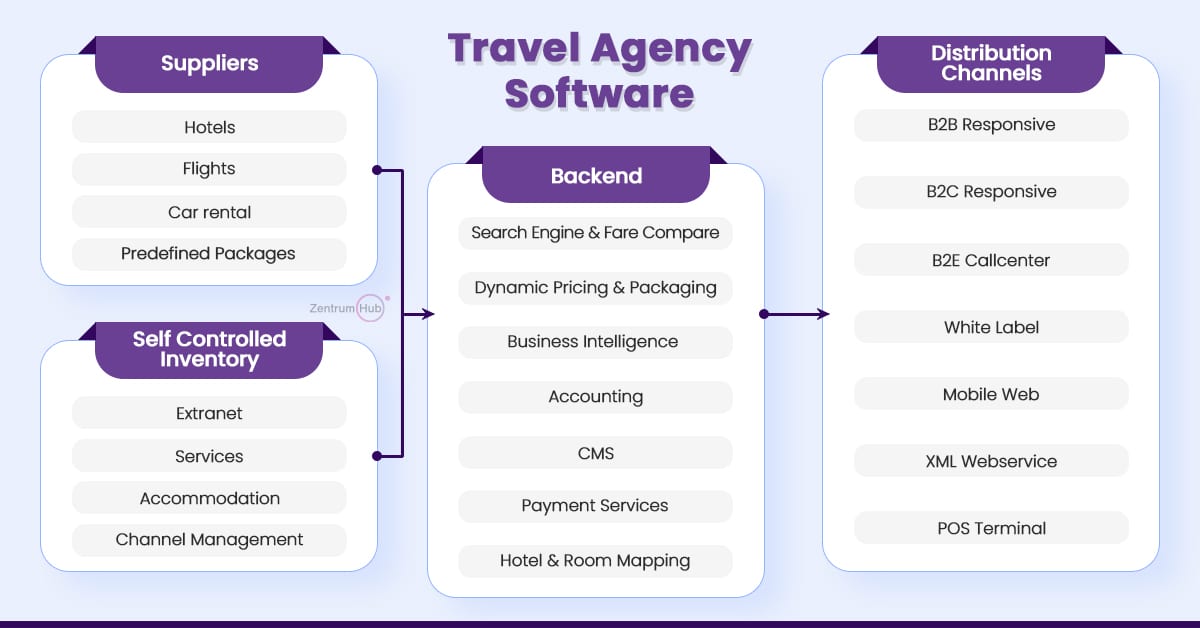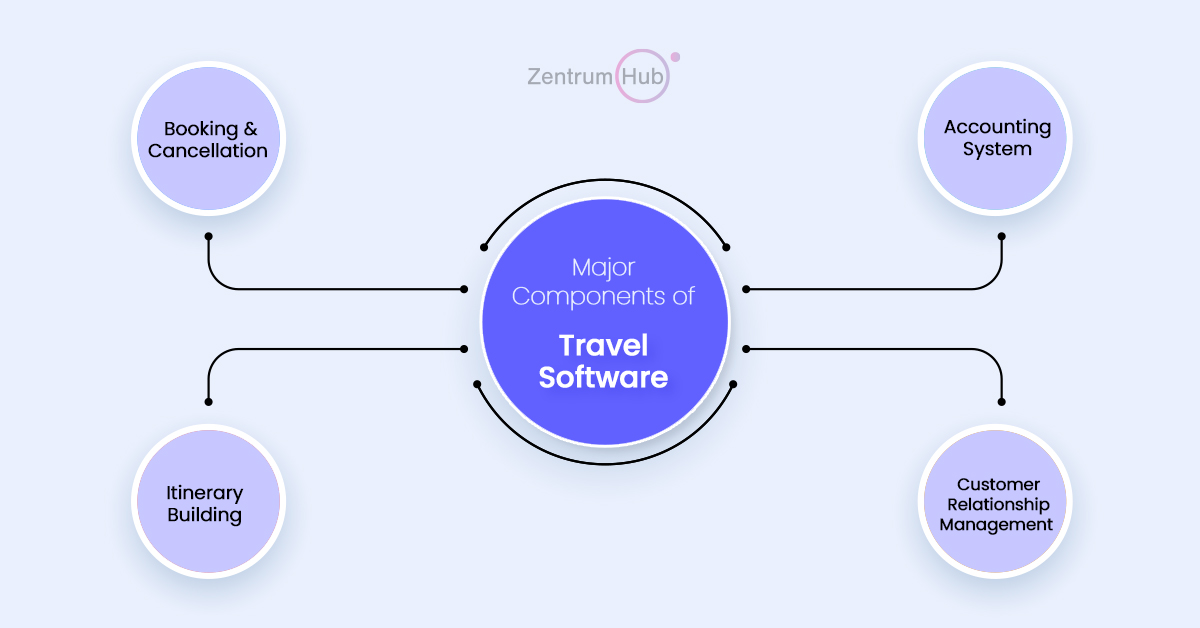Can you imagine a world without online travel booking and mobile apps? Seems impossible, right? However, that was the case two decades ago. Ever since the travel industry has witnessed several changes, traditional travel agencies adapted to the modern methods of the digital age.
It feels nostalgic as the days of handwritten itineraries and paper hotel confirmations are behind us; today, instant online bookings and mobile check-ins have replaced traditional methods. Swiping through travel apps and clicking online reviews has become the go-to approach for seeking popular tourist spots and experiencing new destinations. The shift to online travel and hospitality brings benefits like convenience, personalization, and wider choices.
Today, Online Travel Agencies (OTAs) have become the forefront face of the industry, and to keep up with the growing demands and expectations of travelers, they must step up their game; that is where travel agency software comes into play. So, what does a travel agency software do? How can it help elevate your business to the next level? We will find all these answers in this blog. Let us dive in!

Travel agency software acts as a central hub, streamlining the management and automation of your travel business’s sales, bookings, refunds, back office and revenue management. As an OTA, it is essential to know what features of travel agency software you can leverage to upscale your business.
We are listing some features below:
Booking and Cancellation System: Today, almost every booking is carried out online. As an OTA, it becomes your priority to connect with Global Distribution Systems (GDS), and other hotel and activity suppliers, which will provide access to your end-users with the best deals. Here, travel agency software improves and speeds up the booking process, offering customers more options such as multi-language support, updated pricing, multiple payment options, auto confirmations and notifications.
The booking system also allows you to track and manage all bookings in one place, ensuring accuracy and avoiding overbooking. OTAs can receive real-time updates on cancellations and modifications, which allows for proactive communication with customers.
Accounting System: Integrating your platform with accounting software is essential. It covers online payment with secure SSL encryption, invoices for both partners and clients, detailed financial statements, sales commission calculations, and data analysis.
Accounting systems integrated with various payment gateways to accept credit cards, debit cards, and online wallets streamline the booking process, helping end-users make a hassle-free payment quicker and enhancing their experience.
Itinerary building can be a tedious and tricky task as there are too many factors to consider when planning a trip, such as means of transportation, hotels, and exciting events. If an OTA provides all this information in a detailed manner, it becomes much easier for customers to select a tour package that they specifically need.
An itinerary software can help you create tour packages with the best touring options for the client’s budget and wish. These tours can be segmented into individual, group or corporate travel plans. A well-designed tour plan with plenty of good features also makes you stand out from other OTAs.
Customer Relationship Management Systems are significant when collecting customer data and offering relevant services based on their segment. OTA can utilize this data to create discounted and promotional offers. CRM often provides saving and organizing customer data, segmentation of buyers and providers, and detailed reports on clients, partners, and tours. Additionally, it collects customer reviews, personalized offer development, loyalty programs, newsletters, and more.
Access to crucial data unlocks fresh marketing opportunities. However, visibility is the key. Equipped with effective marketing tools, you can create targeted campaigns, manage social media presence, and build strong customer relationships, making advertising more effective and customers happier.
Read More Integrating Payment Systems into Your Travel Agency Software

Depending on the different functionality, travel agency software can make your OTA more efficient. Most companies prefer ready-to-go solutions. However, you can also opt for tailored solutions as they give more customization options based on your needs. Below are a few options that you should consider:
Business Expenses: Automation has become an integral part of the digital world. Utilizing travel agency software for registering requests and answering questions through chatbots eases the human efforts required for this minimal task. Automating these processes can free your team to focus on strategic marketing and improving customer services.
Data Management: Cloud-based services allow OTAs to access data from sales reports, bookings, payments, and individual preferences, which can help you improve the operational process across different levels. By doing this, you can ensure that you are meeting the demands and expectations of consumers.
Supplier Database: Whether you are a giant travel platform or SME, your OTA needs supplier databases, as they can help you expand your business in various geographic locations. Suppliers have numerous inventories, from large hotel chains to local lodges. You can access these inventories with the help of booking APIs.
Client Management: Based on consumer behaviors, booking history, and transactions, you can easily create custom packages for frequent travelers, offering discounts. This data can also help you create loyalty programs that increase brand value, retain existing customers, and attract newer ones.
Read Also How to Enhance Customer Experience with Travel Agency Software?
Modules are the core functionalities of any travel agency software that offers you a comprehensive overview of the capabilities that are beneficial for online travel agencies. Below are a few modules of travel software.
Hotel Contracting Module: This module allows OTAs to upload contracted hotels and manage hotel inventory. It also lets the user add hotel information, overviews, image gallery, room details such as room type and amenities, rates, along with cancellation policy, discounts and promotions.
Ticketing Module: Through this module, OTAs can keep track of their confirmed, issued, redeemed and cancelled tickets. It also helps to manage allocation easily.
Quotation Management System: can be considered as the primary module of travel agency software as it enables seamless functioning of travel agents and business partners. It allows agents to add markup and create multiple quotations with different hotels, activities, and meals simultaneously. In return, this gives the liberty to end-user to select from multiple travel packages.
Additionally, travel agents can save the quotation in an editable format, so they can customize it according to customize it for their customers. This module also has the option of “add quotation to booking” that provides agent with the ability to book it for customers, blocking it for 72 hours. However, this blocking is auto released if there is failure in payment from customer or agent.
User Management System: This module allows end-users to easily register/sign-up using their social media profiles to create account your travel portal. Users can also view their profile, booking history and upload travel photos by signing to account
Multi-currency and Multi-lingual Module: gives travel agency software support for multiple languages and currencies that helps them to expand their business. End-users find it easier to access the OTA platform that has been curated to their preferred language.
Extranet: This module is used by travel agents to upload the supplier inventories and give them access to updated inventory information.
The online travel industry requires more than a website in today’s competitive landscape. Travel agency software plays the part very well, filling the gaps and streamlining operations, automating tasks that allow you to deliver the best customer experiences. Now that, you have understood the components and features of travel agency software, we certainly that it helps you seamlessly manage your OTA, providing a smooth and hassle-free experience for travelers.
Remember, the world is constantly evolving, and so should your travel technology.
